
Address by Hon. Ali Sabry, Minister of Foreign Affairs of Sri Lanka
55th Regular Session of the Human Rights Council
High-level segment
Mr. President,
Excellencies,
Distinguished delegates,
Ladies and gentlemen,
Let me begin, Mr. President, by congratulating you on your election as the President of the Council. I assure you of my delegation’s full cooperation in discharging your duties.
Sri Lanka has over the years, engaged actively and constructively with the UN Human Rights Council, to enhance the multilateral framework for the promotion and protection of human rights.
Despite the severe constraints we faced, particularly in the recent past, we have continued to maintain such engagement with an extensive array of the helpful working methods of this Council that we believe are productive and beneficial to our people. Our recent engagements, including the UPR Review under the 4th Cycle in February 2023 and the ICCPR Review in March 2023, reflect our commitment to constructive dialogue on human rights and reconciliation.
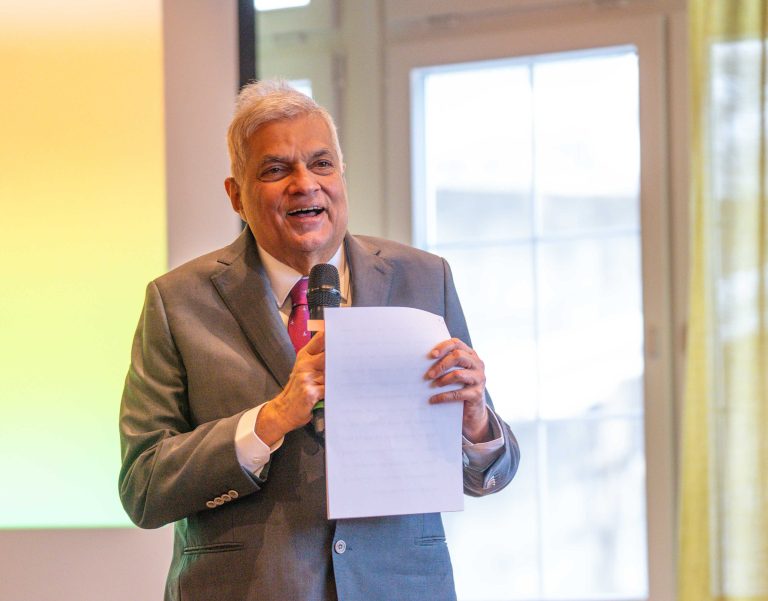
Attending the 54th Annual Meeting of the World Economic Forum (WEF) 2024 in Davos, Switzerland at the invitation of its Founder and Chairman Prof. Klaus Schwab, President Ranil Wickremesinghe interacted with world political and business leaders in addressing a range of issues including debt relief, economic recovery and climate change among others.
President Wickremesinghe participated in panel discussions and roundtables covering topics varying from Sri Lanka’s economic recovery and growth to investment opportunities in Sri Lanka, and the global challenges in the multilateral arena, including climate change and mitigation.
Taking part at the Stakeholder Dialogue, organised by the WEF titled “Pulling debt back from the brink” on 17 January as a panellist, President Wickremesinghe highlighted populism, debt relief, balance of payment and budgetary challenges that all countries face. He pointed out that the expectations of the people have to be met in all countries, and that if strict rules were to be applied, all governments would collapse. Also on the panel were, Wale Edun, Minister of Finance of Nigeria , Professor Laura Alfaro of the Harvard Business School, Professor Kenneth Rogoff of Harvard University, and Vera Songwe of the Liquidity and Sustainability Fund. The President also participated in an interactive informal gathering of world economic leaders on the topic “Restoring faith in the multilateral system” held on 17 January.
Delivering the keynote address at the Green Tech Forum jointly organized by the Swiss Asian Chamber of Commerce and the Latin American Chamber of Commerce, President Wickremesinghe highlighted the opportunities available for investing in Sri Lanka’s renewable energy sector. He also briefed the participants on the framework being established in Sri Lanka to attract green financing.
Participating in a panel organised by the Climate Vulnerable Forum (CVF) on Leaders’ Investment Roundtable, President Wickremesinghe highlighted Sri Lanka’s climate prosperity plan and the urgent need for green climate financing for countries in the Global South. He underlined the urgent need to accelerate global action to expedite climate change mitigation efforts. The President reiterated the need for climate justice and stronger contributions to adaptation and mitigation efforts from advanced economies.
He also briefed the Forum on the Tropical Belt Initiative launched by Sri Lanka at the COP28 in Dubai, which creates a framework for private investment in forests, energy, oceans and mangroves in the countries of the tropical belt. The participation at the WEF provided an opportunity for the President to discuss Sri Lanka’s climate justice and green tech initiatives with former Vice President of the USA and the Founder/Chairman of the Climate Reality Project Al Gore and the US Climate Envoy and former Secretary of State John Kerry.
In a meeting with the Managing Director of the IMF Kristalina Georgieva President Wickremesinghe briefed on improved macro economic indicators in the country that have resulted in positive growth.
During his visit to Davos, President Wickremesinghe also had meetings with the President of Switzerland Viola Amherd, President of Singapore Tharman Shanmugaratnam, President of Ghana Nana Akufo-Addo , President of the European Commission Ursula von der Leyen, Vice President of Nigeria Kashim Shettima , Prime Minister of Cambodia Hun Manet, Prime Minister of Pakistan Anwar ul Haq Kakar, Prime Minister of Mongolia Oyun-Erdene Luvsannamsrai, and the Foreign Minister of Norway Espen Barth Eide.
At the Business Roundtable jointly organized by the Board of Investment of Sri Lanka and the Swiss Asian Chamber of Commerce on 16 January, President Wickremesinghe underlined Sri Lanka’s economic recovery and stabilisation processes and highlighted the opportunities for investment notably in renewable energy, agriculture modernization, tourism, IT and infrastructure development. The President also responded to questions raised by the participants that ranged from health, education, renewable energy and banking to agriculture and manufacturing. On the sidelines of the WEF 2024, the President also had meetings with heads of multinational companies, including Maersk and Uber.
Addressing business leaders from India, at the Roundtable organized by the Consortium of Indian Industry, President Wickremesinghe highlighted the macro-economic stabilisation brought about over the past year and invited Indian companies to make use of the unique opportunities in renewable energy, infrastructure development, agriculture and tourism. The President also responded to specific queries and concerns put forward by companies that have already invested in Sri Lanka, and bilaterally followed up with a number of Indian companies including Menzies Aviation, Adani Group, Bharati Airtel and ReNew.
The 2024 Annual Meeting of the World Economic Forum was held under the theme `Rebuilding Trust´, and saw the participation of leaders from over 100 governments, major international organizations, global business leaders, as well as civil society, academics and experts, young change-makers, social entrepreneurs and the media.
Permanent Mission of Sri Lanka to the United Nations
Geneva
21 January 2024
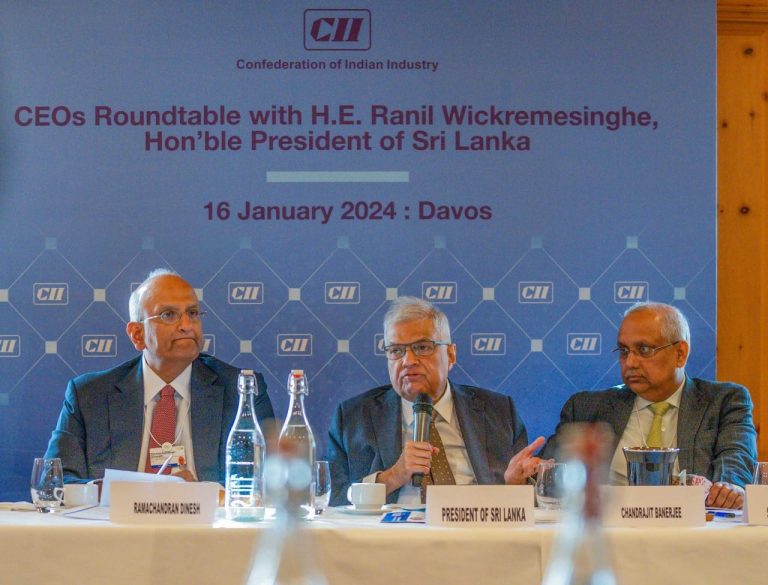
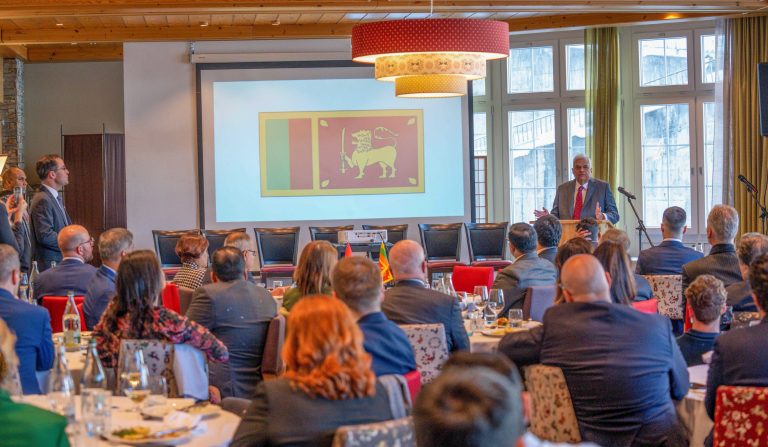
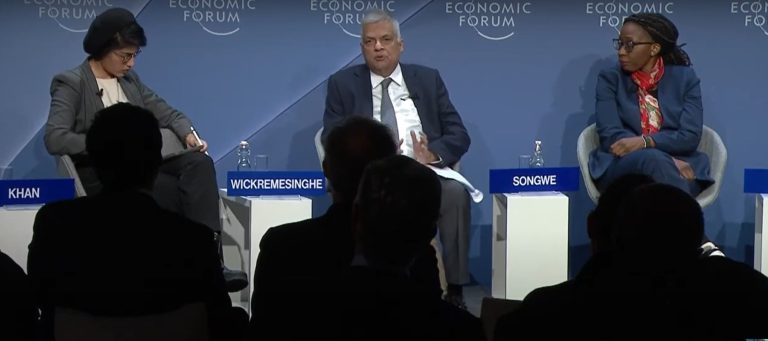
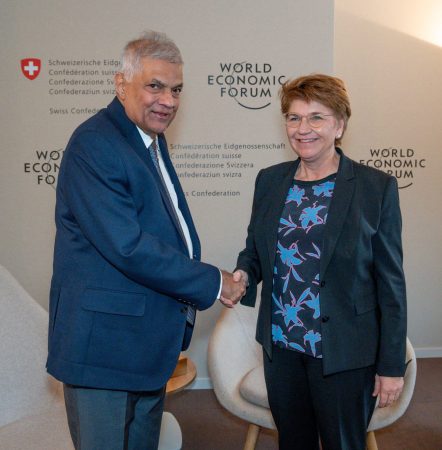
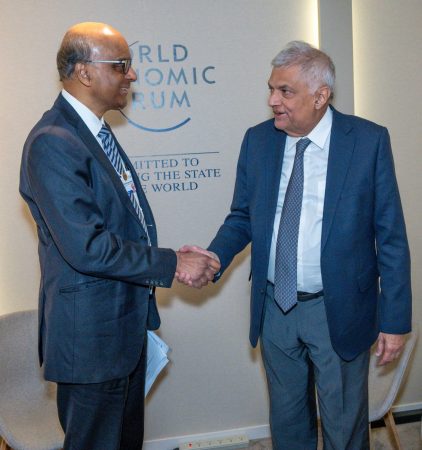
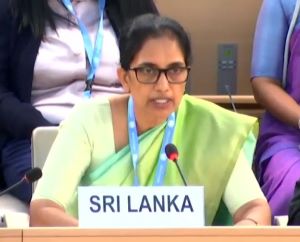
54th Session of the Human Rights Council
Agenda Item 2 - General Debate
Statement by Her Excellency Himalee Arunatilaka, Ambassador and Permanent Representative of Sri Lanka to the United Nations in Geneva
13th September 2023
Mr. President,
Resolutions 60/251 and 48/141 require that the work of this Council and the OHCHR should be guided by the principles of universality, impartiality, objectivity and non-selectivity, and constructive international dialogue and cooperation.
Unfortunately, this does not appear to be the case with regard to Sri Lanka.
One such instance in the Written Update is the reference to the investigations on the Easter Sunday Attacks of 2019. It is regrettable that the OHCHR has sought to use incorrect and unsubstantiated information from biased sources in their analysis. As Sri Lanka has repeatedly informed this Council, extensive and comprehensive investigations have been carried out by the GoSL with regard to these attacks including a Presidential Commission of Inquiry, the report of which was submitted to the Parliament. Investigations carried out by the Government authorities were assisted by international professional agencies including the Australian Federal Police, the FBI of the United States and INTERPOL.
As at April 2023, 79 have been indicted in Easter Sunday terror attacks related matters. On 12 January 2023, the Supreme Court of Sri Lanka delivered its judgement on the Fundamental Rights petition that was filed against the President, IGP, Director of State Intelligence Service, Defence Secretary and Chief of National Intelligence, at the time of these attacks.
In addition, the Government has decided to establish a Parliamentary Select Committee to address concerns raised in the public domain as of late and the President has appointed a committee, led by a retired Supreme Court judge to investigate the relevant allegations.
Mr. President,
We appreciate the many positive comments made by countries during the Interactive Dialogue on Sri Lanka, acknowledging the visible progress on the ground.
Mr. President,
Sri Lanka supports the One China policy and we welcome China’s cooperation with UN human rights mechanisms. We reiterate that interference in the internal affairs of any sovereign country cannot and should not be tolerated.
Thank you.
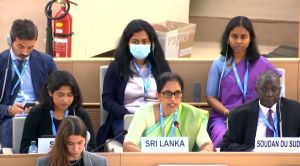
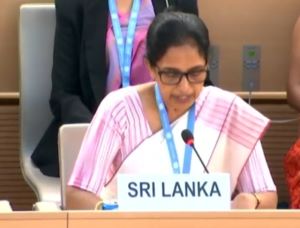
The written update on Sri Lanka was presented at the 54th Session of the Human Rights Council that commenced on 11 September 2023 in Geneva by the Deputy High Commissioner for Human Rights Nada al-Nashif.
Delivering Sri Lanka´s statement as the country concerned, Permanent Representative of Sri Lanka to the United Nations in Geneva, Ambassador Himalee Arunatilaka at the outset reiterated that Resolutions 46/1 and 51/1 were adopted by a divided vote in the Council where the majority of the Member States either opposed or abstained from voting on these Resolutions, in fundamental disagreement with its unacceptable content, in particular the so-called evidence gathering mechanism, the establishment of which is unprecedented.
Sri Lanka rejected the written update by the High Commissioner for Human Rights titled ‘Situation of Human Rights in Sri Lanka’ together with its conclusions and recommendations, while reaffirming its commitment to pursuing tangible progress through domestic institutions.
While raising concerns regarding the content of the written update which does not reflect the actual ground situation in the country, Sri Lanka stated that the economic, social and financial stabilization achieved in the past year has been appreciated and acknowledged domestically and externally by those who have expertise.
Sri Lanka regretted that the OHCHR has also chosen to ignore the democratic resilience of the country in the past year and strongly objected to the written update pronouncing on policy matters that are essentially domestic for any sovereign country and outside the framework of the Council, which is unhelpful. Sri Lanka rejected all Conclusions and Recommendations including references to targeted sanctions based on incorrect and unsubstantiated sources contravening the principles of natural justice and the principles of universality, impartiality, objectivity and non-selectivity.
Ambassador Arunatilaka reaffirmed that Sri Lanka will continue to engage constructively with other mechanisms of the Council, in keeping with our close engagement with the international community and the Council in other areas of its work.
46 countries spoke during the Interactive Dialogue that followed the presentation of the written update. Many acknowledged the economic recovery measures and progress achieved by the domestic institutions on reconciliation and Sri Lanka’s continued constructive engagement with the Human Rights Council.
Making a strong statement against the OHCHR’s ‘accountability mechanism’, the Philippines called it ‘an expensive mandate worth 10 million US dollars to support a Geneva based team with an open-ended work timeframe’, that ´runs parallel to and divorced from functioning domestic processes´.
Syria stated that the Sri Lanka accountability project was initiated without the consent of, nor consultation with Sri Lanka, and affirmed that such acts are contrary to the Council's founding principles of impartiality, objectivity and non-selectivity and contravened the mandate of the Council.
Venezuela rejected the 'so-called Sri Lanka accountability project' which is an interventionist mechanism that ignored the internal process taking place in Sri Lanka and while the progress made by Sri Lanka in upholding human rights since restoring peace in 2009 has not been given a true value by the Council.
Pakistan expressed concerns over the imposition of external accountability measures that are inconsistent with the provisions of the UN charter and UNGA Resolution 60/251 and the IB package.
Cuba stated that punitive mechanisms only give rise to politicization and proliferation of double standards and do not contribute in any way to the promotion and protection of human rights.
China extended support to Sri Lanka in safeguarding national sovereignty, independence, social stability and promoting economic development and stated that Resolution 51/1 does not follow the principles of fairness and objectivity and non-selectivity and it did not have the approval of the country concerned.
Lao PDR was also of the view that ‘the imposition of country specific resolutions without the consent of the concerned country are counterproductive and against the principle of impartiality, objectivity and not selectivity’.
Belarus said it was ‘concerned by the ongoing practice of pressurizing Sri Lankan authorities by foisting on them nonconsensual mechanisms’, and noted Sri Lanka’s continuing cooperation with a number of UN human rights mechanisms.
Eritrea mentioned that ‘mechanisms which lack the consent of the country concerned are counterproductive and going against the principle of genuine dialogue and cooperation in human rights.
Türkiye recognized the significant reforms by Sri Lanka in the economic sector and also in the areas of governance, the legal system and social welfare, including the steps taken to advance the reconciliation process, establishment of the constitutional council, adoption of the new anti-corruption law and developing anti- terrorism legislation, promotion of women's rights and strengthening of accountability measures.
Oman, speaking on behalf of the Gulf Cooperation Council noted in particular the all-party conferences convened in December 2022 and January 2023 to promote reconciliation and accountability.
Maldives mentioned that 'the support and cooperation of the international community [is] vital for Sri Lanka to overcome its current social and economic challenges'.
The Russian Federation considered the practice of artificially stirring up excitement around the human rights situation in Sri Lanka, to be counterproductive.
Nepal appreciated the 'continuous engagement of Sri Lanka with the Human Rights Council, OHCHR and other human rights mechanisms' and welcomed the positive initiatives, including 'Aswesuma', launch of Sri Lanka National SDG dashboard, and passing of the the 21st amendment to the Constitution in October 2022.
Japan acknowledged ‘the amendment to the prevention of Terrorism Act as an important initial step’. Japan also expressed support to 'Sri Lanka's efforts to establish transnational justice mechanisms including the Truth and Reconciliation Commission' and added that Japan would ´continue to support Sri Lanka on both the human rights and the economic fronts´.
Norway, speaking on behalf of the Nordic Baltic countries welcomed ‘the Government’s efforts to set up a Truth- seeking mechanism’.
Nigeria applauded the Government of Sri Lanka for its ‘resilience and determination to improve the socio-economic well-being of its people, as well as the initiatives put in place to subvert the adverse effects of the challenges encountered in the recent past.’
Uganda said it ‘specifically welcomes the efforts of the Office of the Missing Persons in helping families and victims trace their loved ones and find closure through reparations’.
Yemen commended the ‘positive cooperation shown by the Government of Sri Lanka´ and stressed the ‘importance of cooperation and coordination with the concerned country’.
Burundi noted that ‘Sri Lanka has managed to provide the stability of its democratic institutions’, and reiterated ‘the principles of sovereign equality of respect for territorial integrity and non-interference as enshrined in the UN charter should guide the work of this Council’.
India said that ‘as a close neighbour and friend of Sri Lanka, India has consistently supported Sri Lanka 's efforts towards the relief, rehabilitation, resettlement and reconstruction process in Sri Lanka since 2009’.
Nicaragua reiterated the need for respect for the principle of equality and the principles in the United Nations Charter, namely not to interfere in matters that are under the domestic jurisdiction of states.
Vietnam acknowledged Sri Lanka’s ‘efforts and initiatives in addressing issues of reconciliation and accountability such as the establishment of the Cabinet Sub Committee on reconciliation, and the Office for Overseas Sri Lankans’.
Kazakhstan expressed support to ‘the reforms of Sri Lanka in the economic sectors, legal system and social welfare, as well as the efforts aimed at protecting and promoting human rights and freedoms.’
Kyrgyzstan said ‘Sri Lanka's economic crisis has been aggravated by external factors including the global pandemic and public debt’. Kyrgyzstan added that many developing countries faced the same foreign debt issues which have been described by the UN Secretary General as ‘a development disaster, fueled by a crushing debt crisis.’
Azerbaijan emphasized 'all matters falling within the domestic jurisdiction of UN member states including that of Sri Lanka must be addressed through dialogue and cooperation'.
Algeria underlined that the report addressed ‘very complex issues that are the purview of the country concerned´.
Iran said the HRC should promote human rights ‘through dialogue and international cooperation based on principle of non-selectivity, impartiality and objectivity’ and ‘refrain from politicization and political prejudice’.
Egypt also emphasized the importance of objectivity and non-selectivity when reviewing matters pertaining to human rights, as well as avoiding politicization of human rights and non-interference in the domestic affairs of a country.
Cambodia commended Sri Lanka’s endeavours in promoting gender equality and the role of Office for Reparations in contribution to livelihood support.
The European Union recognized ‘the challenges Sri Lanka has been facing due to the economic and financial crisis throughout last year’, and ´the positive course of action over the past months, leading the country towards economic stabilisation´. EU also took note of ‘plans for reconciliation mechanisms, and the President’s dialogue with Tamil political parties’, and encouraged the Government to ´remain engaged with the UN and partners´.
The United Kingdom welcomed Sri Lanka’s initial commitments to implement devolution in line with the Constitution, to address land issues and to advance governance legislation.
Switzerland commended the efforts made by the Government to bring about reconciliation and to undertake reform in order to strengthen the rule of law and said that Switzerland stands ready to facilitate dialogue platforms as part of the reconciliation process in Sri Lanka.
Canada welcomed Sri Lanka ‘s positive engagement with the UPR process and acknowledged that Sri Lanka is developing legislation to replace the PTA.
New Zealand welcomed Sri Lanka´s ‘progress in stabilizing its economy following the country's acute economic crisis’, and acknowledged ´recent focus on reconciliation including the proposed establishment of a national unity and reconciliation Commission´.
Germany recognized ‘the burden the people of Sri Lanka are facing following the economic crisis’, and commended ´recent initiatives for dialogue´. Germany further took note of ´the President’s initiative to form a Truth-Finding Mechanism’.
France welcomed what the Government has done to restore the economy.
The United States recognized that ‘Sri Lanka strengthened reforms including anti-corruption legislation’ and also welcomed the release on bail of over 100 individuals held without trial and on the Prevention of Terrorism Act.
Montenegro positively noted ‘some encouraging developments and trends´ in addressing the impact of the economic and financial crisis of 2022. Montenegro noted as ´exemplary´ the ´dialogue with Tamil political parties´ initiated by the President, and commitment to settle devolution and land matters.
Malawi commended Sri Lanka´s cooperation during the compilation of the High Commissioner´s report and commended the ´positive legal reforms that the government of Sri Lanka has implemented despite the challenges faced´.
Australia welcomed 'Sri Lanka’s commitment to replace the prevention of Terrorism Act´ and encouraged ´broad stakeholder consultations to develop a replacement law'.
The Sri Lanka delegation was led by the Permanent Representative of Sri Lanka to the UN, and comprised officers attached to the Permanent Mission in Geneva.
Permanent Mission of Sri Lanka to the United Nations
Geneva
13 September 2023
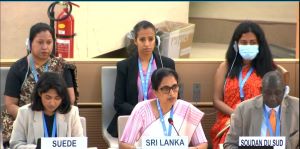
GoSL Statement made by H.E. Himalee Arunatilaka, the Permanent Representative of Sri Lanka to the United Nations in Geneva
54th Session of the Human Rights Council:
Report on Sri Lanka by the High Commissioner for Human Rights
pursuant to HRC Resolution 51/1
11 September 2023
Mr. President,
At the outset, let me reiterate that the Government of Sri Lanka (GoSL) has consistently rejected Resolution 46/1 and 51/1 that led to the setting up of the so-called ‘Accountability Project’. We also reject the written update, its conclusions and recommendations.
We recall that the majority of the Member States either opposed or abstained from voting on these Resolutions, in fundamental disagreement with its unacceptable content in particular the so-called evidence gathering mechanism, the establishment of which is unprecedented. We reiterate that it goes beyond the mandate that Member States conferred on the Council by UNGA Resolution 60/251.

Sri Lanka Digital Investment Summit (DIS) 2023 will be organized by The Computer Society of Sri Lanka (CSSL) and Information and Communication Technology Agency (ICTA) on 13 October 2023 at the Hotel Shangri-La Colombo from 9.00 am onwards, under the patronage of the Government as a public- private partnership.
The event is also a part of the GoSL‘s DIGIECON 2023-2030 strategic initiative. It has its key objective of leveraging the technology industry for economic prosperity and economic resurgence at a time the GoSL is expecting to increaseICT export revenue from USD 1.8 Bn level in 2022 to USD 3.0 Bn in 2024.

For more information : https://nitc.lk/
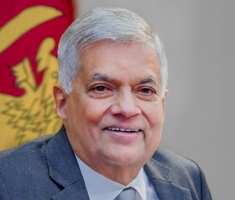
The World Health Day Message
'Health for All'
For the past seven and a half decades, ‘World Health Day,’ has been observed on 7th April under the sponsorship of the World Health Organization (WHO), with the overall objective of raising global awareness on physical and mental health, as well as people's well-being, in a bid to enhance public health conditions. This year’s commemoration is of an augmented significance, with the WHO celebrating its 75th anniversary on the same day. My warm felicitations to Dr Tedros Adhanom Ghebreyesus, WHO Director General and the officials, especially the Representative to Sri Lanka, on this auspicious occasion.
This event presents the possibility for the WHO and others working on overall health issues to be recognized for their selfless service, as well as to seek additional ways and means of extending improved healthcare nationally, regionally and globally. It is undoubtedly a juncture for the WHO to take stock on its successes and strategies on facing challenges to ensure good health universally.
The theme of this year's World Health Day, of “Health for All,” is extremely timely, particularly with the COVID-19 Pandemic having severely impacted the well-being of the global population, both physically and mentally. The Pandemic exacerbated the existing health issues worldwide, and it is now opportune for increased international action to ensure global health.
Sri Lanka has made significant progress in key health indicators, including the eradication of malaria, filariasis, polio and neonatal tetanus, with there also being a steady increase in life expectancy. Regrettably however, Sri Lanka's health system faces challenges from an ageing population, as well as the need to address the burden of non-communicable diseases, which currently claim nearly 75% of all deaths in the country.
It is noteworthy that Sri Lanka is recognized internationally for its health achievements, while being one of the top performers in Sustainable Development Goal 3 of Good health and well-being. The remaining challenges for its full attainment, also hampered by the unprecedented economic crisis, are being addressed by the Government together with the WHO.
I wish to take this opportunity to acknowledge the valuable work and unstinted support to Sri Lanka by the WHO, which undoubtedly would contribute to accomplishing the vision of ‘Health for All’, as a global priority. May this milestone celebration of the WHO, galvanise the institution to further strengthen the execution of its stated mission.
Ranil Wickremesinghe
President
Democratic Socialist Republic of Sri Lanka
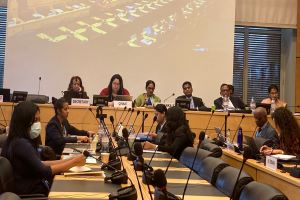
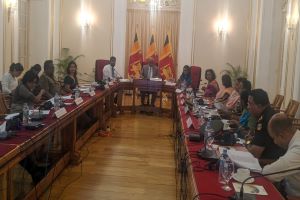
Sri Lanka participated in its 6th Periodic Review under the International Covenant on Civil and Political Rights (ICCPR) on 8 and 9 March 2023in Geneva. The Review was conducted in a hybrid format, during three 2-hour sessions over two days by the Human Rights Committee. The preparations for the Review were led by the Ministry of Foreign Affairs over the past several weeks and included participation by a number of government agencies.
The Human Rights Committee is a body comprised of 18 independent experts that monitor the implementation of the ICCPR. The Reviews of all States Parties to the Covenant are conducted by the Committee. In addition to Sri Lanka the Committee also reviewed Egypt, Turkmenistan, Zambia, Peru, and Panama during its 137th Session from 27 February to 24 March 2023.
In her opening statement, the Head of the Sri Lanka Delegation Permanent Representative of Sri Lanka to the UN in Geneva Ambassador Himalee Arunatilaka, said that since the submission of Sri Lanka’s 6th Periodic Report in 2019, many significant developments in the country have taken place, including the enactment of the 21st Amendment to the Constitution, further strengthening democratic governance through the Constitution, Regulation of Election Expenditure Act, amendments to the Prevention of Terrorism Act and drafting of anti-terrorism legislation, reconciliation through independent domestic mechanisms, convening of an All Party Conference, establishment of a Cabinet Sub-Committee on Reconciliation and release of land held by military for security purposes in the North and the East to the legitimate owners. Ambassador Arunatilaka also pointed out that the period under review posed unprecedented socio-economic challenges for Sri Lanka and the Government’s main objective during the past year was to restore economic and political stability and on delivering urgent socio-economic necessities.
The Chairperson of the Human Rights Committee Tania María Abdo Rocholl in her opening remarks commended the high representation of women in the Sri Lanka delegation. During the Review, the Human Rights Committee acknowledged the progress made by Sri Lanka including resettlement of internally displaced persons, welcomed the releasing of private land held by the military to legitimate civilian owners and the adoption of the Prevention of Domestic Violence Act, and recognized the efforts made to combat gender-based violence.
The interactive discussion between the Sri Lanka delegation the Committee covered a wide range of issues relating to the constitutional and legal framework within which the International Covenant on Civil and Political Rights (ICCPR) is implemented.
The Committee members raised issues concerning interalia, the constitutional reform process, independence of the judiciary, rights of freedom of association, expression, assembly and religion, states of emergency, alleged discrimination against LGBTI persons, allegations of intimidation against journalists, human rights defenders and civil society. The Sri Lanka delegation responded
and engaged constructively with the members of Human Rights Committee during the Review and also undertook to provide written responses to some of the questions raised.
In her closing remarks, Ambassador Arunatilaka highlighted that Sri Lanka participated in the Review in a spirit of openness and constructive engagement amidst several socio-economic challenges.
The delegation comprised senior officials from the Ministry of Foreign Affairs, Presidential Secretariat, Attorney-General’s Department and the Permanent Mission of Sri Lanka to the UN in Geneva participating in person. Senior officials participating from the Ministry of Foreign Affairs in Colombo joined the Review virtually representing the Ministry of Justice, Prison Affairs and Constitutional Reforms, Ministry of Defence, Ministry of Women, Child Affairs and Social Empowerment, Ministry of Public Security, Ministry of Health, Department of Prisons, Department of Police, National Dangerous Drugs Control Board, Bureau of the Commissioner General of Rehabilitation, Office on Missing Persons (OMP), Office on Reparations (OR), Office for National Unity and Reconciliation (ONUR).
Permanent Mission of Sri Lanka to the UN
Geneva
10 March 2023
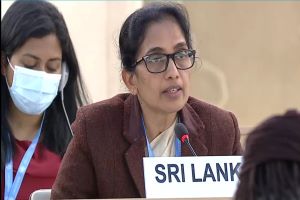
Mr. President,
Distinguished delegates,
I take the floor in keeping with Sri Lanka’s continuing policy of constructive engagement with the UN human rights instruments and mechanisms.
As we mark the 75th anniversary of the UDHR, and the 30th anniversary of the Vienna Declaration and Programme of Action (VDPA), we must resolve to preserve the spirit of multilateralism and the foundation of human rights governance. We must also strive to depoliticize human rights and find solutions to concerns through dialogue and multilateral cooperation rather than through confrontation, selectivity and unilateralism.
Mr. President,
We envisage 2023, the 75th anniversary of our independence, which coincides with the 75th Anniversary of the adoption of the Universal Declaration to be a year of socio-economic stabilization, reconciliation, and recovery.
The domestic institutions for reconciliation and accountability in Sri Lanka continue to carry out their work towards achieving important post-conflict recovery and healing.
A Cabinet Sub-Committee has been established under the Chairmanship of the President, to promote reconciliation among different communities and to address and resolve matters relating to issues encountered by the peoples of the Northern and Eastern Provinces.
The Committee has identified issues to be addressed expeditiously, including, developing a truth-seeking mechanism, drafting a new counter-terrorism law, establishing an office for overseas Sri Lankans, preparing a Rapid Development Plan for the North and the East, and addressing matters related in particular to missing persons, resettlement and land.
Discussions are in progress relating to a Truth-Seeking Mechanism within the framework of the Constitution while the contours of a model that would suit Sri Lanka are currently being assessed.
The 21stamendment to the Constitution of Sri Lanka, passed by Parliament in October 2022, provides for further strengthening of democratic governance, independent oversight of key institutions, the composition of the Constitutional Council and independent commissions.
A Cabinet appointed Sub-Committee is developing legislation on counterterrorism that balances national security concerns with international standards and best practices.
The Regulation of Election Expenditure Bill passed in Parliament in January 2023, envisages to vest the Elections Commission with the powers to monitor campaign expenditure.
The recent judgment of the Supreme Court on the Easter Sunday attack offers important insights into the independence of the judiciary.
Work is under way to operationalize an Office for Overseas Sri Lankan Affairs to facilitate more vigorous engagement with expatriate Sri Lankans encompassing all communities and generations.
In January 2023, the Sustainable Development Council issued guidelines to all Ministries to identify nationally appropriate SDG targets. The objective is to direct Government planning and resources towards SDGs amidst the economic challenges, and to ensure robust national level monitoring and progress evaluation.
Mr. President,
Sri Lanka’s economic vulnerability has increased in the face of global recession, conflict and turmoil. The Government has put in place several social protection measures for the most vulnerable segments of society with the assistance received from international partners.
Despite the current socio-economic challenges and constraints, our resolve to the promotion and protection of human rights and fundamental freedoms of our people remains steadfast and determined.
Mr. President,
A series of unhelpful resolutions have been adopted by the HRC, the latest being resolution 51/1, without our consent as the country concerned. I reiterate Sri Lanka´s position, which was stated by the Minister of Foreign Affairs last October, that we reject this resolution, which will extend and reinforce the so-called external evidence gathering mechanism on Sri Lanka established by the OHCHR in line with its own interpretation of Resolution 46/1. These resolutions are unhelpful to the people of my country, will polarize Sri Lankan society, and do not serve the objective of promoting reconciliation in Sri Lanka. We are of the view that this is an unproductive drain on the scarce resources of UN Member States which can be productively deployed elsewhere.
Mr. President,
Despite our opposition to country specific resolutions, as explained to this Council before, we remain open to discussion with the Council, Special Procedures and Treaty Bodies, and continue to believe in the value of constructive engagement.
It is in this constructive spirit, that Sri Lanka participated in the UPR Process last month, despite the difficult circumstances in the country. We consider the UPR to be an extremely important tool, enabling countries to mutually assess the progress of each other’s human rights situation through engagement with peers in an atmosphere that is constructive and mutually respectful. Sri Lanka also looks forward to a meaningful dialogue when our 6th Periodic Report under the ICCPR is taken up for Review later this month.
I thank you, Mr. President.
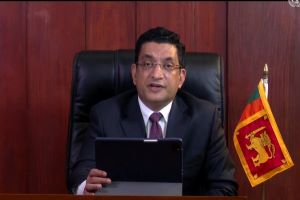
Sri Lanka concluded its 4th Cycle of the Universal Periodic Review (UPR) during the 42nd Session of the UPR Working Group on Wednesday 1st February in Geneva. Sri Lanka’s National Report was prepared by the Ministry of Foreign Affairs with input from government ministries and agencies through an inclusive and broad-based process where civil society organizations and the National Human Rights Commission of Sri Lanka were also consulted.
The UPR is conducted as a review mechanism by the UPR Working Group of the UN Human Rights Council in four year cycles. Sri Lanka’s last UPR review was in 2017.
Delivering the opening statement via a pre-recorded statement, the Head of Delegation, Foreign Minister Ali Sabry highlighted the progress and achievements made by Sri Lanka since its last review including the implementation of the recommendations accepted. Sri Lanka envisages 2023, the 75th anniversary of independence, to be a year of socio-economic stabilization, reconciliation, and recovery. The Minister also said that “it is important to learn from the past, and it is equally important to move on, to build better and stronger.”
The Permanent Representative to the UN in Geneva Ambassador Himalee Arunatilaka highlighted legislative and policy measures implemented by Sri Lanka during the reporting period including the 21st Amendment to the Constitution, strengthening efforts on the reconciliation processes and the national independent institutions.
The Sri Lanka delegation responded to the queries and comments from the floor ranging from issues relating to inter alia freedom of expression and assembly, the Prevention of Terrorism Act (PTA), migrant workers, rights of minorities, combating corruption, social protection, rights of women, persons with disabilities, children, food security and progress achieved on SDGs.
The Review was conducted in a constructive atmosphere with the participation of delegates from 106 countries providing their appreciation, comments and recommendations covering a broad range of issues on the floor. Appreciation was expressed for the implementation of recommendations accepted by Sri Lanka in the 3rd Cycle, despite the socio economic challenges posed by the COVID pandemic and global crises.
Serbia, Zambia and Cuba welcomed the implementation of recommendations accepted in the last Cycle.
Bangladesh welcomed efforts “to establish gender equality, and curb gender based violence”. Bhutan commended Sri Lanka for its “concerted efforts and progress in implementing its human rights obligations despite the enormous socio-economic challenges.” Nepal welcomed the adoption of the National Nutrition Policy. India “took note of the engagement by the Government of Sri Lanka with members of the international community and other organizations on various aspects of human rights situation and reconciliation issues in Sri Lanka.” Maldives congratulated the Government for “introducing a policy for Gender Mainstreaming in all sectoral Ministries that includes the establishment of gender focal points, gender-responsive budgeting and anti-sexual harassment committees.” Pakistan appreciated “Sri Lanka’s continued cooperation with UN human rights mechanisms” while also welcoming “legislative, administrative measures such as the enactment of the Prevention of Terrorism Act (Amendment) Act No 12 of 2022, 21st Amendment to the Constitution and measures under National Anti-Human Trafficking Task Force”.
Thailand commended Sri Lanka for achieving COVID vaccination coverage of its targeted population above WHO targets.
Japan appreciated “the positive steps taken by Sri Lanka since the previous review cycle, including the implementation of Amendments to the Prevention of Terrorism Act”. Japan said it “considers it important that the international community support Sri Lanka’s own efforts to foster reconciliation in the country”.
Chile, Egypt and Ireland also noted with appreciation the recent amendments to the PTA.
The UK welcomed “Sri Lanka’s commitments on respect for the rights of those from all religious and ethnic groups” and further said Sri Lanka’s “recent efforts to foster political inclusion and constitutional reform are particularly welcome.”
Qatar, noted with appreciation the adoption of the National Action Plan on Women, Peace and Security”. This was also welcomed by Spain. Algeria, welcomed the “constitutional amendment of 2022”.
Türkiye was “pleased to observe that Sri Lanka amended the Prevention of Terrorism Acts and held an All-Party Conference to revive reconciliation process.”
Philippines welcomed the “recent approval of the establishment of the Office for Overseas Sri Lankans”.
Nigeria commended the Government for its “unwavering commitment to its international human rights obligations and continued cooperation with human rights mechanisms.”
Saudi Arabia commended Sri Lanka’s “tireless work to achieve the goals of sustainable development and combat human trafficking”.
Namibia appreciated the “specific legislative, policy and institutional measure adopted by Sri Lanka with the aim of fulfilling its obligations under international human rights law.”
Oman appreciated the National Action Plan to combat trafficking of persons.
China, Russia, Cuba, Venezuela and Malaysia made supportive statements on Sri Lanka’s efforts.
UAE appreciated “ongoing national reconciliation path in line with local priorities and policies”.
Several other countries commended Sri Lanka’s continuous efforts to promote human rights of its people, in particular the adoption of the 21st Amendment to the Constitution, work of the independent commissions and domestic reconciliation efforts including the work of the OMP, OR and ONUR. Countries also underlined the importance of the promotion and protection of the rights of children, women, persons with disabilities, older persons and migrants. Many countries appreciated the constructive engagement of Sri Lanka with the UPR process and the efforts take in preparing the national Report.
Belgium appreciated “efforts by the government to tackle gender-based violence” while noting remaining challenges.
Azerbaijan, Ethiopia, Hungary and Vietnam commended Sri Lanka’s progress made on the SDGs. Several countries welcomed Sri Lanka’s efforts towards socio-economic stabilization, reconciliation and recovery despite challenges.
While thanking all Government and civil society partners who engaged in the UPR process and the delegations who spoke during the Review, Sri Lanka’s Permanent Representative in Geneva said that Sri Lanka will carefully consider the recommendations received
In closing the Review, the President of the Council and Chair of the Session, PR of the Czech Republic thanked the Sri Lanka delegation for its engagement and readiness to answer all questions and comments, as well as the preparations which he said were done “in an excellent manner.”
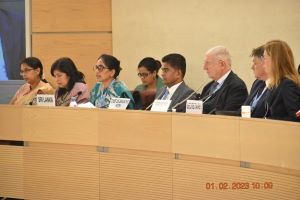
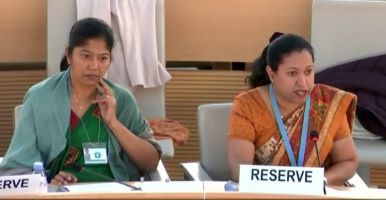
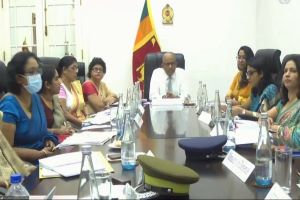
The delegation of Sri Lanka was led by Foreign Minister Ali Sabry. The delegation in Geneva comprised of the Permanent Representative of Sri Lanka to the UN in Geneva, senior officials from the Presidential Secretariat, the Attorney General’s Department, Ministry of Foreign Affairs and the Permanent Mission of Sri Lanka to the UN, as well as over 20 line Ministries joining virtually from Colombo.
Permanent Mission of Sri Lanka to the UN
Geneva
1st February 2023
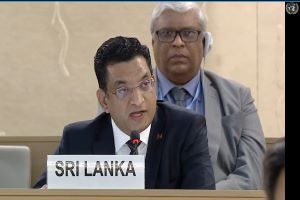
Sri Lanka categorically rejected resolution A/HRC/51/L.1 (Rev.1) titled "Promoting reconciliation, accountability and human rights in Sri Lanka" tabled by the United Kingdom, Canada, Germany, Malawi, Montenegro, North Macedonia, and the United States, which was adopted by a vote at the Human Rights Council (HRC) in Geneva, today (06 October 2022).
Minister of Foreign Affairs Ali Sabry delivered the statement on behalf of Sri Lanka as the country concerned and called on the Members of the Council to reject the resolution by voting against it.
In support of Sri Lanka’s position opposing the resolution, the delegation of Pakistan called for a vote. Over half of the members of the Council did not support the resolution with 07 countries (Bolivia, China, Cuba, Eritrea, Pakistan, Uzbekistan and Venezuela) voting against the resolution and 20 countries abstaining on the vote. 20 countries voted in favour of the resolution.
Representatives of Pakistan, Brazil, China, Venezuela, Japan and Republic of Korea made statements in support of Sri Lanka prior to the vote.
Pakistan said that they share the concerns of Sri Lanka and other Member States that the resolution is intrusive and this level of scrutiny would not be even acceptable to any sovereign state including the Core Group. They further observed that the resolution fails to recognize the horrendous acts of terrorism committed by the LTTE and its sponsors, lacks balance, proportionality and consistency. At a critical time when the people of Sri Lanka expect demonstrations of global solidarity and support to face its economic challenges which are not entirely of Sri Lanka’s own making, the Core Group chose a path that has the potential to exacerbate the problem instead of improving the situation.
Brazil noted the need to avoid politicization of the work of the Council and reiterated their position that cooperation of the country concerned is key to the success of this Council’s initiatives. Brazil highlighted the responsibility of the international community to support the country in its recovery including through international cooperation and assistance.
China appreciated the Government of Sri Lanka’s commitment to promoting and protecting human rights, advancing sustainable socio-economic development, improving living standards, protecting the rights of the vulnerable groups, facilitating national reconciliation and combatting terrorism. China regretted that the resolution is tabled without the consent of country concerned, is a product of politicization, and will by no means play any positive role in the promotion of human rights in Sri Lanka. China highlighted that the work of Council should be guided by its founding principles and that all parties should promote genuine dialogue and cooperation and refrain from adopting double standards. China rejected the practice of using human rights as a pretext to interfere in the internal affairs and undermine the sovereignty of other countries to the detriment of international cooperation.
Venezuela expressed their deep concern at initiatives that do not have the support of the country concerned and that the Core Group is insisting on imposing hostile initiative, monitoring and oversight mechanism without the consent of Sri Lanka, ignoring the progress made by the Government. Venezuela highlighted that the mechanism financially bleed out over 6 million dollars that could have been better used to support the least developed countries and further that the practice of wasting money seems all too common in the Council.
Japan recognized the progress made by Sri Lanka and said that the Government’s own initiatives, efforts and commitments are indispensable to achieving real change on the ground.
Republic of Korea noted with appreciation the efforts of the Government of Sri Lanka to promote national reconciliation, reconstruction and prosperity.
Sri Lanka is grateful to the countries which withstood pressure by the sponsors and demonstrated their support to Sri Lanka by voting against or abstaining on the vote as well as by speaking in support of Sri Lanka.
While delivering the Sri Lanka statement as the country concerned, the Foreign Minister regretted that a draft resolution on Sri Lanka is tabled once again despite the progress made domestically on reconciliation and human rights and Sri Lanka’s continued constructive engagement with the Council. He outlined Sri Lanka’s intention to move forward domestically with replacing the Prevention of Terrorism Act (PTA) with a comprehensive national security legislation, and the introduction of Constitutional amendments and a legal framework to strengthen democratic governance, participation and the rule of law as well as independent institutional oversight. On reconciliation and human rights, Sri Lanka is awaiting the final report of the Presidential Commission and the establishment of a domestic truth-seeking mechanism is under advanced discussion. He also referred to Sri Lanka’s upcoming engagement with the UPR process.
Minister Sabry highlighted that while the resolution may meet the objective of advancing the political considerations of the sponsors, it is manifestly unhelpful to Sri Lanka.
The Minister strongly opposed the resolution, particularly the proposal in Operative Paragraph (OP) 8 that seeks to ‘extend and reinforce’ the so-called “external evidence gathering mechanism” created by the Office of the High Commissioner for Human Rights (OHCHR). The mechanism is outside the mandate envisaged for the Council. No sovereign state can accept the superimposition of an external mechanism that runs contrary to its Constitution and which pre-judges the commitment of its domestic legal processes.
The Minister also noted that many countries have already raised serious concerns on the budgetary implications of this resolution given its ever-expanding mandate. He further noted that this is an unhelpful and misdirected drain on the resources of all Member States, including the donors in the midst of ongoing global crises. In sharp contrast, he said that we are faced with the dire financial needs of developing countries to prevent hunger and child malnutrition.
Foreign Minister Sabry objected to the references in the resolution to matters which are outside the framework of the Council such as domestic economic and financial policy. He further observed that solutions to economic and financial crises faced today by many countries will not be found in the mandate, the instruments or the expertise of the Council.
The result of the vote demonstrates that the resolution is another example of the North-South polarization and politicization of the Council, contrary to its founding principles. This vote also demonstrated solidarity among the countries of the South which continued to support the basic founding principles of the Human Rights Council of universality, impartiality, objectivity and non-selectivity leading to constructive international dialogue and cooperation.
The Human Rights Council is comprised of 47 Members, including 13 African states, 13 Asia- Pacific states, 8 Latin American & Caribbean States, 7 Western Europe and Other States, and 6 Eastern European States.
Read Full Sri Lanka statement as the country concerned
Ministry of Foreign Affairs
Colombo
6 October, 2022